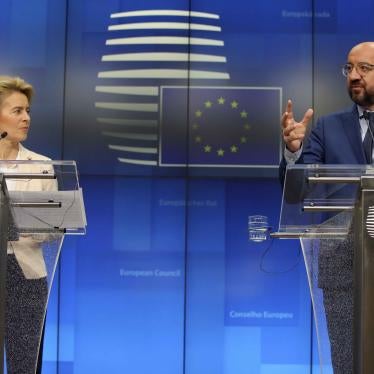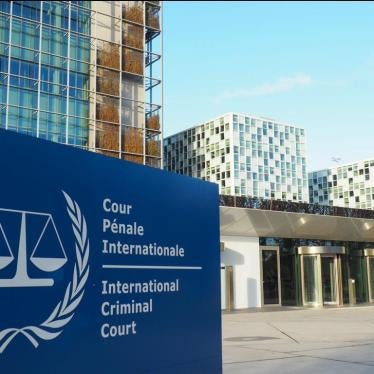Dear Commissioner Reynders,
Dear Members of the European Parliament,
We are writing to draw your attention to Human Rights Watch’s key recommendations for elements to be included in new EU legislation on mandatory human rights and environmental due diligence, including on climate change. We welcome the Commission’s and the European Parliament’s commitments and initiatives towards that goal, and we encourage you to make this one of your top priorities for 2020.
Effective EU due diligence legislation is urgently needed given how businesses cause and contribute to adverse human rights and environmental impacts.[1] Nearly a decade after the UN Guiding Principles on Business and Human Rights (UNGPs) were adopted, a vast majority of business enterprises globally do not conduct any human rights or environmental due diligence. As reported in the January 2020 EU study on due diligence requirements, only 16 percent of the 334 business respondents surveyed from different sectors, and outside the EU, said they undertake due diligence that takes into account human rights and environmental impacts throughout their value chain.[2] A slightly higher number—37 percent—indicated they undertake due diligence for the first tier of their suppliers.[3]
Even where business enterprises say they conduct human rights and environmental due diligence, the quality and effectiveness of their processes vary significantly and are difficult to evaluate in the absence of common legal standards. Human Rights Watch research across different sectors has found that companies often do not implement adequate human rights and environmental due diligence processes, failing to take the appropriate steps to prevent, mitigate, and remedy human rights abuses and environmental harms in their value chains. Companies rarely communicate the results of the measures they are taking to stakeholders, making it difficult or impossible to gauge whether their processes are having any positive impacts. Overall, the uptake of effective human rights due diligence has been painfully slow.
Robust EU legislation is especially important in the context of the commitments made by the European Commission as part of the European Green Deal, and should explicitly address anthropogenic climate change given the serious and irreversible harm it poses to rights and livelihoods. [4] Requiring business enterprises to align their operations with the goals of the Paris Agreement on climate change seems especially pressing in light of research that shows how some entities, including financial institutions, bear responsibility for an enormous proportion of current and historical emissions of greenhouse gas.[5]
Finally, binding EU-wide legislation that sets a common standard would bring about uniformity and legal certainty and go a long way in leveling the playing field. Business respondents themselves—52 percent of those responding to an EU level survey—indicated that the existing laws governing due diligence requirements for human rights and environmental impacts were not “effective, efficient, and coherent.”[6]
In light of these considerations, we urge you to ensure that the new EU legislation eventually adopted:
- Requires business enterprises to respect internationally recognized human rights, including labor rights, in their own operations and business relationships, including global value chains;
- Broadly applies to all business entities across all sectors regardless of how they are incorporated or structured;
- Mandates that business enterprises conduct effective human rights and environmental due diligence, including on climate change, clearly laying the minimum set of processes and principles for such due diligence;
- Requires full transparency in value chains;
- Includes a European enforcement mechanism, ensuring it has adequate budget and resources to support effective implementation;
- Incentivizes compliance and foresees clear consequences for non-compliance, including penalties; and
- Creates a civil course of action and access to judicial remedies.
Please find our detailed recommendations for the legislation in the annex to this letter.
We look forward to engaging with you as you develop strong and effective mandatory human rights and environmental due diligence legislation, and we stand ready to discuss any of our recommendations and to provide any further information on this file.
Yours sincerely,
Arvind Ganesan
Director, Business and Human Rights
Human Rights Watch
Lotte Leicht
European Union Advocacy Director
Human Rights Watch
[1] For more Human Rights Watch reporting on business and human rights, see https://www.hrw.org/topic/business
[2] European Commission commissioned study by British Institute of International and Comparative Law et al., “Study on Due Diligence Requirements in Supply Chains: Final Report,” January 2020, pp. 45-46. The top sectors represented in the survey include manufacturing, automotive, information technology and technology, financial services, consumer goods, agriculture and agribusiness. 13 percent of the business survey respondents were based outside the EU, capturing Switzerland, USA, Japan, and Australia.
[3] Ibid., p. 48.
[4] See Chiara Macchi, 'The Climate Change Dimension of Business and Human Rights: Legal and Policy Trends in the European Union', Draft paper, 24 May 2020 (on file with the author).
[5] See research by the Climate Accountability Institute on “Carbon Majors” available at https://climateaccountability.org/carbonmajors.html, and BankTrack et al, “Banking on Climate Change – Fossil Fuel Finance Report Card 2019,” March 20, 2019, https://www.banktrack.org/article/banking_on_climate_change_fossil_fuel_finance_report_card_2019# (accessed June 15, 2020)
[6] Ibid., p. 94.








